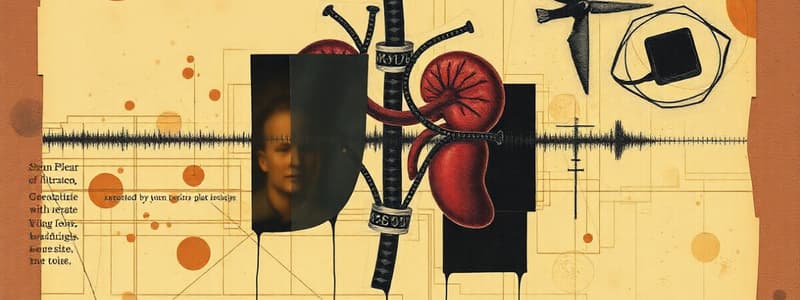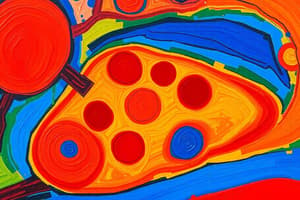Podcast
Questions and Answers
What remains in the blood as fluid filters out of the glomerular capillary?
What remains in the blood as fluid filters out of the glomerular capillary?
- Electrolytes
- Red blood cells
- Glucose
- Proteins (correct)
What happens to the πGC at the end of the glomerular capillary?
What happens to the πGC at the end of the glomerular capillary?
- It fluctuates randomly.
- It decreases significantly.
- It remains constant.
- It increases. (correct)
Which Starling pressure primarily affects the glomerular filtration rate (GFR)?
Which Starling pressure primarily affects the glomerular filtration rate (GFR)?
- Hydrostatic pressure in Bowman's capsule
- Hydrostatic pressure in the glomerular capillary (correct)
- Colloid osmotic pressure in Bowman's capsule
- Venous pressure
What is the effect of constricting the afferent arteriole on GFR?
What is the effect of constricting the afferent arteriole on GFR?
What influences changes in PGC (hydrostatic pressure in the glomerular capillary)?
What influences changes in PGC (hydrostatic pressure in the glomerular capillary)?
What remains constant in the patient's GFR measurement despite an increase in urine flow?
What remains constant in the patient's GFR measurement despite an increase in urine flow?
How is the clearance of inulin and creatinine calculated?
How is the clearance of inulin and creatinine calculated?
What does GFR primarily represent in renal physiology?
What does GFR primarily represent in renal physiology?
What effect does drinking large volumes of water have on GFR when inulin infusion remains constant?
What effect does drinking large volumes of water have on GFR when inulin infusion remains constant?
Why is creatinine used clinically to assess kidney function?
Why is creatinine used clinically to assess kidney function?
Which of the following statements about inulin is true?
Which of the following statements about inulin is true?
If a patient's [U] inulin decreases while [P] inulin stays the same, what happens to GFR?
If a patient's [U] inulin decreases while [P] inulin stays the same, what happens to GFR?
What is renal plasma flow (RPF) fundamentally related to?
What is renal plasma flow (RPF) fundamentally related to?
What is the normal filtration fraction for renal plasma flow?
What is the normal filtration fraction for renal plasma flow?
What does renal clearance measure?
What does renal clearance measure?
When a substance has a high renal clearance, what does this imply?
When a substance has a high renal clearance, what does this imply?
Which of the following substances is likely to have a low renal clearance?
Which of the following substances is likely to have a low renal clearance?
How is renal clearance calculated?
How is renal clearance calculated?
What happens to the 80% of renal plasma flow that is not filtered?
What happens to the 80% of renal plasma flow that is not filtered?
In the given sample problem, what is the plasma concentration of sodium (Na+)?
In the given sample problem, what is the plasma concentration of sodium (Na+)?
If a patient collects 1.44 L of urine over 24 hours, what is the urine flow rate per hour?
If a patient collects 1.44 L of urine over 24 hours, what is the urine flow rate per hour?
What effect does constriction of the efferent arteriole have on glomerular filtration rate (GFR)?
What effect does constriction of the efferent arteriole have on glomerular filtration rate (GFR)?
Which factor primarily results in changes to the hydrostatic pressure in the glomerular capillary (PGC)?
Which factor primarily results in changes to the hydrostatic pressure in the glomerular capillary (PGC)?
What is a primary characteristic of a marker used to measure glomerular filtration rate (GFR)?
What is a primary characteristic of a marker used to measure glomerular filtration rate (GFR)?
Why is inulin considered a good marker for measuring GFR?
Why is inulin considered a good marker for measuring GFR?
What is the primary outcome when there are low levels of angiotensin II?
What is the primary outcome when there are low levels of angiotensin II?
Which statement about glomerular filtration is true?
Which statement about glomerular filtration is true?
What is the main role of Starling forces in kidney physiology?
What is the main role of Starling forces in kidney physiology?
What happens to renal blood flow (RPF) when the efferent arteriole is constricted?
What happens to renal blood flow (RPF) when the efferent arteriole is constricted?
Which equation correctly represents the relationship between GFR and Starling forces?
Which equation correctly represents the relationship between GFR and Starling forces?
What is a potential impact of elevated hydrostatic pressure in the glomerular capillaries?
What is a potential impact of elevated hydrostatic pressure in the glomerular capillaries?
What happens to the oncotic pressure of glomerular capillary blood if unfiltered proteins increase?
What happens to the oncotic pressure of glomerular capillary blood if unfiltered proteins increase?
Which statement accurately describes the filtration fraction?
Which statement accurately describes the filtration fraction?
If the filtered load of a substance is less than its excretion rate, what is likely occurring?
If the filtered load of a substance is less than its excretion rate, what is likely occurring?
Study Notes
Glomerular Filtration
- Proteins are left behind when fluid filters out of the glomerular capillary blood
- Glomerular capillary hydrostatic pressure (PGC) and glomerular colloid osmotic pressure (πGC) increase with filtration of fluid
- Net ultrafiltration pressure becomes 0 by the end of the glomerular capillary
Starling Forces
- Starling forces drive glomerular filtration rate (GFR)
- Changes in PGC are due to changes in the resistance of the afferent and efferent arterioles
- Constriction of the afferent arteriole increases resistance and reduces GFR
- Vasoconstriction of the afferent arteriole can happen with an increase in the sympathetic nervous system activity or high levels of angiotensin II
- Constriction of the efferent arteriole increases resistance and increases GFR
- Vasoconstriction of the efferent arteriole can happen with low levels of angiotensin II
GFR Measurement
- Glomerular filtration rate (GFR) is a marker for nephron function
- Measured using the clearance of a glomerular marker
- A glomerular marker is freely filtered across the glomerular capillaries, is not reabsorbed or secreted by the renal tubule, and does not alter the GFR
- Inulin is a good marker for GFR as it is freely filtered across the glomerular capillary wall and is neither reabsorbed nor secreted by renal tubular cells
- The amount of inulin filtered across the glomerular capillaries equals the amount excreted in urine
- Inulin must be infused intravenously, as it is not found endogenously
- Clearance of inulin equals GFR, which further equals excretion rate of inulin or creatinine
- Creatinine is used clinically to measure GFR, as it is a product of muscle metabolism, it is filtered and not reabsorbed or secreted
GFR Equation
- GFR = [U]inulin/Cr x V = Cinulin/Cr
- [U]inulin/Cr: [inulin or creatinine] in urine
- V = Urine flow rate
- [P]inulin/Cr: [inulin or creatinine] in plasma
- Cinulin/Cr: clearance of inulin or creatinine
Filtration Fraction
- Filtration fraction is the relationship between GFR and RPF
- Filtration fraction is the fraction of RPF filtered across the glomerular capillaries
- FF = GFR/RPF
- The normal filtration fraction is ~20%
Renal Clearance
- Renal clearance is the rate at which a substance is removed/cleared from plasma
- Complete volume of plasma that is cleared of a substance by the kidneys per unit time
- C = [U]x x V / [P]x
- C = clearance
- [U]x: urine concentration of substance x
- V= urine flow
- [P]x: plasma concentration of substance x
- The higher the renal clearance, the more plasma completely cleared of that substance
Clearance Ratio
- The clearance ratio for sodium, CRNa+ = CNa+/Cinulin
- CNa+ = Renal clearance of sodium
- Cinulin = Renal clearance of inulin
- If CRNa+ < 1, then Na+ is reabsorbed
- If CRNa+ > 1, then Na+ is secreted
True/False Questions
- Glomerular filtration is the last step in urine formation: False
- Starling Forces modify GFR: True
- GFR is indirectly proportional to NFP: True
- Unfiltered proteins will ↑ the oncotic P of glomerular capillary blood: True
- Filtration fraction = RPF / GFR: False
- Inulin is a glomerular marker, as is creatinine: True
- If Filtered load < excretion rate, we expect a substance is reabsorbed: True
Studying That Suits You
Use AI to generate personalized quizzes and flashcards to suit your learning preferences.
Related Documents
Description
This quiz covers the fundamental concepts of glomerular filtration, focusing on the role of Starling forces in regulating glomerular filtration rate (GFR). It explains how changes in pressures and resistance in the afferent and efferent arterioles affect GFR. Test your understanding of these essential physiological principles.




